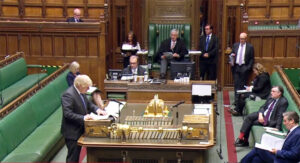
Boris Johnson has declared the end of coronavirus restrictions today as officials step up plans for post-pandemic Britain.
Working-from-home guidance and Covid passes will be scrapped from next week although people will still be told to wear facemasks. Whether this remains law or reverts to guidance is still being finalised.
Local Covid testing centres will start to be shut down from the spring as part of the long-term strategy for living with the virus.
The Treasury is demanding savings from the £10 billion testing budget and health officials have begun working on a plan to scale back the network of thousands of test centres.
The prime minister confirmed the end of plan B measures after Sajid Javid, the health secretary, promised yesterday to “substantially reduce restrictions” on January 26.
A government spokeswoman said that “the latest data is encouraging, with cases beginning to fall”, although she emphasised that “the pandemic is not over”. Ministers will now turn their attention to how to handle coronavirus for the rest of the year and beyond as the Omicron wave recedes. The planning is being co-ordinated by the Cabinet Office Covid task force.
Some sources have pencilled in the end of February for an announcement about the next stage but others believe that this is not realistic and it is more likely in spring.
The plans are at an early stage but are expected to include dates for the end of compulsory isolation for people who test positive for Covid and the end of free lateral flow tests.
Officials are also examining scaling back PCR testing, which has expanded in the past two years to a network of six mega-labs and thousands of local test centres, which mean the average person in England travels two and a half miles for a test. There is acceptance among ministers that this cannot be sustained over the long term, with testing costing about £10 billion a year and budgets for the coming months not fully settled. “The wind-down will be quite swift and will mean fewer test centres because we don’t need all of the sites,” one government source said.
The Department of Health is insisting on being able to increase testing capacity quickly if a new variant emerges. Health officials argue this will represent value for money if it means not having to impose further restrictions.
Yesterday 94,432 infections were reported in the UK, bringing the seven-day average below 100,000 for the first time since December 23; it peaked this month at 180,000. Professor Andrew Hayward, a member of the government’s Nervtag advisory group, told Times Radio that there was “genuinely an optimistic picture” and “very encouraging signs” in the data.
Nicola Sturgeon, the Scottish first minister, said that Scotland was on the “downward slope” of infections and that all remaining Omicron measures will be scrapped next week. However, David Nabarro, the World Health Organisation’s Covid chief, yesterday cautioned against abandoning restrictions too quickly. “It’s important that there is no premature promising that restrictions will end at a particular time or we’ll be able to get back to normal at a particular time,” he told the BBC.
Responding to news, Shevaun Haviland, Director General of the British Chamber of Commerce, said: “News of the end of work from home guidance will be welcomed by business, particularly those based in city and town centres which rely on footfall from office workers. The removal of the requirement for vaccine passports will also be positive for our members in the events sector and night-time economy.
“With infection rates still high, many firms are experiencing significant staff absences and will be cautious about teams rushing back to the office when that could result in further absences.
“As we move forward, businesses will now want to know what the Government’s longer-term contingency plans are to support firms should a new variant create a fresh wave of serious infections and require restrictions.
“Confusion and loss of confidence was experienced at the onset of Plan B when no accompanying support was announced. Although a financial package was subsequently provided by the Treasury, being clear on what support will accompany which restrictions ahead of time is the best way to maintain business confidence.
“Maintenance of testing capacity must also be a priority for Government, with reports still reaching us of firms unable to access rapid testing at times when they need it. This supply must remain consistent to maintain consumer confidence and avoid unnecessary absences.
“As we move out of restrictions, Government must make positive interventions to power forward our economic recovery, by making strides on key issues such as growing our export base and levelling up local economies.”
Read more:
Johnson announces the end of plan B Covid restrictions
